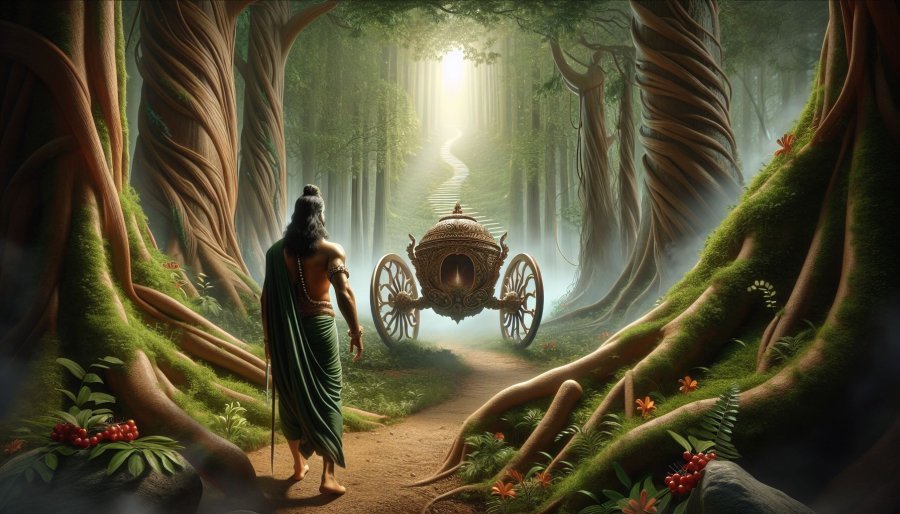Section XLII [summary]
Book index: Mahabharata (English)
This page contains a summary of the Mahabharata Section XLII including examples of moral lessons in daily life. The Maha-Bharata is one of the largest epics ever written containing roughly 100,000 Sanskrit verses. It deals with the legendary history of ancient India and contains a large number of interwoven tales.

Short summary of the chapter:
Arjuna, the mighty warrior and son of Kunti, was visited by the charioteer of Indra, Matali, who came to take him to the celestial realm. Arjuna, after some hesitation, agreed to ascend the divine chariot sent by Indra and began his journey to the heavens. Before boarding the chariot, Arjuna purified himself in the Ganges, offered prayers to the Pitris, and bid farewell to the mountain Mandara, expressing gratitude for the hospitality and joy he had experienced there. Upon ascending the celestial car, Arjuna traveled through the sky, witnessing majestic sights and celestial beings, including royal sages, heroes, Gandharvas, Apsaras, and heavenly regions filled with self-effulgent light.
As Arjuna soared through the heavens, he beheld thousands of beautiful celestial cars and marveled at the extraordinary beauty and splendor of the realms he passed through. In this realm, there was no need for natural sources of light as the whole region was illuminated by the virtue of ascetic merit. Arjuna was filled with wonder at the sight of royal sages, heroes, Gandharvas, and other celestial beings who adorned the heavens with their presence. Matali explained to Arjuna that these shining entities were virtuous beings stationed in their respective places, appearing as stars when viewed from the earth.
Arjuna's journey through the celestial realms continued, and he beheld the majestic elephant Airavata standing at the gates of Indra's city, Amaravati. As he passed through the region of virtuous kings, Arjuna's own brilliance and nobility shone like that of Mandhata, a legendary king. Finally, Arjuna arrived at Amaravati, the grand city of Indra, where he would meet the king of the gods and embark on a new chapter of his celestial adventure. The journey through the heavens had been a breathtaking and enlightening experience for Arjuna, showcasing the wonders and magnificence of the celestial realms beyond mortal comprehension.
Full English translation:
This page is merely a summary which is automatically generated. If you are looking for authentic sources such as the Sanskrit text or the Full English translation of Mahabharata Section XLII, have a look at the following articles:
Section XLII, online text
English translation by Kisari Mohan Ganguli.
Read this and other chapters online.
Mahabharata (English Summary)
by Kisari Mohan Ganguli | ISBN-10: 8121505933
Buy the latest edition:
FAQ of Section XLII:
How did Arjuna prepare before ascending the celestial car?
Arjuna purified himself with a bath, prayed, and offered oblations to the Pitris. He also bid farewell to the mountain he had stayed on.
What did Arjuna see while traveling on the celestial car?
Arjuna saw thousands of beautiful celestial cars, royal sages, heroes, and heavenly beings. He also witnessed self-effulgent regions and celestial beings like Gandharvas and Apsaras.
Who greeted Arjuna to ascend the celestial car?
The charioteer Matali, sent by Indra, greeted Arjuna to ascend the celestial car. He informed Arjuna that Indra wanted to see him in Amaravati.
Where did Arjuna eventually arrive after his journey on the celestial car?
Arjuna eventually arrived at Amaravati, the city of Indra, after passing through various regions of heaven and witnessing celestial beings along the way.
Mahabharata Section XLII in daily life:
The story above, rich with mystical elements and celestial grandeur, offers profound insights into virtues such as humility, respect for nature, and the pursuit of wisdom and strength through righteous paths. In the tale, Arjuna, a mighty warrior, showcases humility when called upon by the divine chariot, highlighting that no matter one's achievements, humbleness remains essential. This can be a reminder in our daily lives to approach our successes and interactions with modesty, recognizing that there's always something greater than ourselves.
Furthermore, Arjuna's interaction with the mountain and his farewell embodies a deep respect for nature, acknowledging it as a source of sustenance, knowledge, and sanctuary. This resonates with the idea that in our day-to-day life, we should not only appreciate the natural world around us but also protect and cherish it as a pivotal part of our existence and well-being.
Lastly, the narrative underlines the importance of pursuing goals with pure intent, as Arjuna embarked on his journey not for personal gain but to obtain divine weapons for the greater good. It serves as a powerful reminder that our ambitions should not be self-serving but aimed towards the greater good, fostering a community spirit and a sense of purpose beyond our individual desires.
Overall, the saga of Arjuna’s celestial voyage encapsulates virtues of humility, respect for nature, and nobility of purpose. It encourages us to reflect on our actions and aspirations, urging us to live a life marked by humility, environmental stewardship, and a commitment to the collective wellbeing of society, all while navigating the challenges of our personal quests with integrity and courage.
